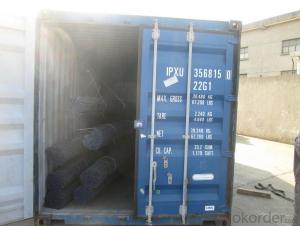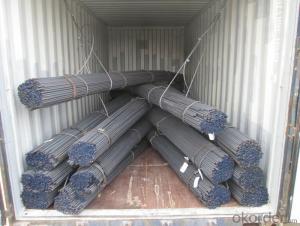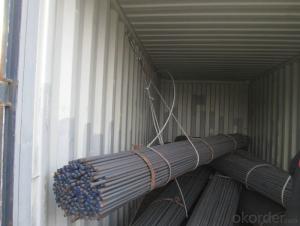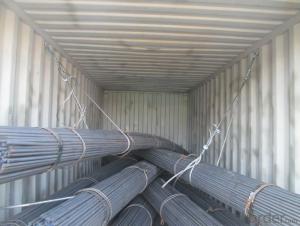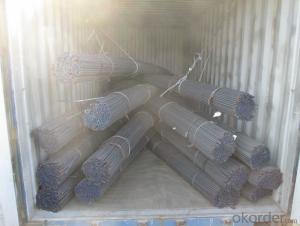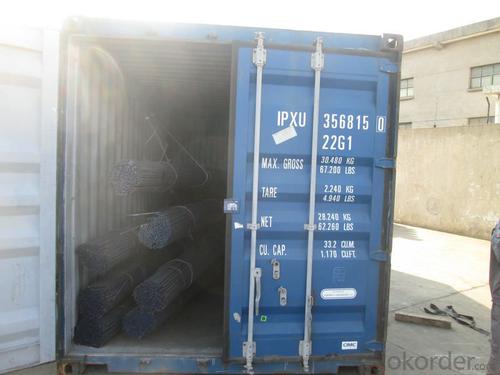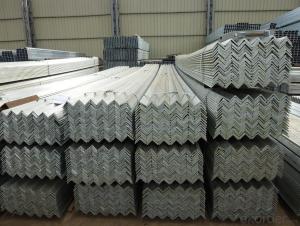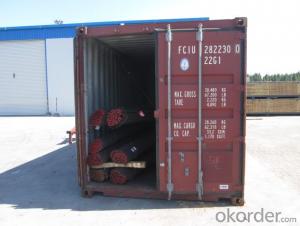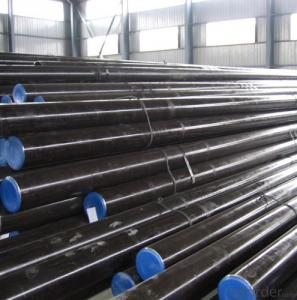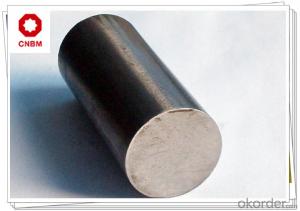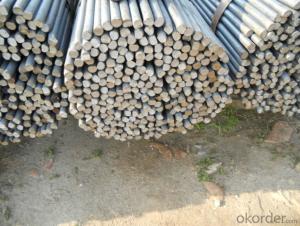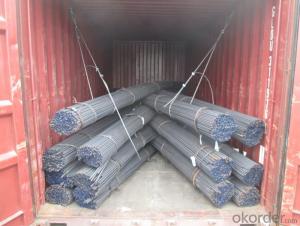Common Steel Round Bar SS400 Product with high quality
- Loading Port:
- Tianjin
- Payment Terms:
- TT or LC
- Min Order Qty:
- 25 m.t.
- Supply Capability:
- 7000 m.t./month
OKorder Service Pledge
OKorder Financial Service
You Might Also Like
OKorder is offering Common Steel Round Bar SS400 Product with high quality with worldwide shipping. Our supplier is a world-class manufacturer of steel, with our products utilized the world over. OKorder annually supplies products to European, North American and Asian markets. We provide quotations within 24 hours of receiving an inquiry and guarantee competitive prices.
Product Applications:
Common Steel Round Bar SS400 Product with high quality are ideal for structural applications and are widely used in the construction of buildings and bridges, and the manufacturing, petrochemical, and transportation industries.
Product Advantages:
OKorder's Common Steel Round Bar SS400 Product with high quality are durable, strong, and resist corrosion.
Main Product Features:
· Premium quality
· Prompt delivery & seaworthy packing (30 days after receiving deposit)
· Corrosion resistance
· Can be recycled and reused
· Mill test certification
· Professional Service
· Competitive pricing
Product Description:
Specifications of Common Steel Round Bar
1. Grade: 304, 316L, 321
2. Type: Mild carbon steel
3. Shape: Round bar, solid bar of steel with circular section
4. Diameter: 8mm-150mm
5. HS Code: 72283010
Usage and Applications of Common Steel Round Bar
1. Common Steel Round Bar of 8-25mm, or small round is mostly used for straight bundles supply, and used for steel, bolts and various mechanical parts. While the bigger round bar, or more than 25mm hot rolled bar, is mainly for the manufacture of mechanical parts or for seamless steel billet.
2. Steel round bar is used in construction and a large number of architectural and engineering structures.
3. Besides, we can supply some especial material steel round bar that can be used for main shaft of steamer, hummer shank, with big section and supper force.
Packaging & Delivery of Common Steel Round Bar
Packaging Detail: All goods are packed in bundle with steel strips and shipped by break bulk vessel or container (depend on target market and different ports)
Delivery Detail: 45 days
Trade terms: FOB, CFR, CIF
MOQ: 25 tons per specification; we can negotiate the quantity if the specification is normal or we have stock of one specification.
Weight: The price invoicing on theoretical weight basis or actual weight basis depends on customer’s request.
Shipment: The shipment of bulk break or container is depends on customer’s request and the situation of the port of destination.
Documents given: Full set of original clean on board bill of lading; Original signed commercial invoice; Original packing list; Policy of insurance; Certificate of origin and what the target market needs.
Production Flow of Common Steel Round Bar
We use advanced equipments like Electric Arc Furnace, Ladle Furnace and Vacuum Degasser to produce our products.
Material prepare (billet) — heat up — rough rolling — precision rolling — cooling — packing — storage and transportation
Characteristics of Common Steel Round Bar
1. The steel in which the main interstitial alloying constituent is carbon in the range of 0.12–2.0%.
2. As the carbon percentage content rises, steel has the ability to become harder and stronger through heat treating; however it becomes less ductile.
3. Quality should be in conformity with the specification of the manufacturer. Quantity and packing conditions should be in conformity with the term in the contract.
4. Regardless of the heat treatment, higher carbon content reduces weld ability. In carbon steels, the higher carbon content lowers the melting point.
FAQ:
Q1: Why buy Materials & Equipment from OKorder.com?
A1: All products offered byOKorder.com are carefully selected from China's most reliable manufacturing enterprises. Through its ISO certifications, OKorder.com adheres to the highest standards and a commitment to supply chain safety and customer satisfaction.
Q2: How do we guarantee the quality of our products?
A2: We have established an advanced quality management system which conducts strict quality tests at every step, from raw materials to the final product. At the same time, we provide extensive follow-up service assurances as required.
Q3: How soon can we receive the product after purchase?
A3: Within three days of placing an order, we will begin production. The specific shipping date is dependent upon international and government factors, but is typically 7 to 10 workdays.
Images:
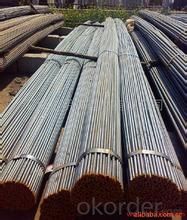
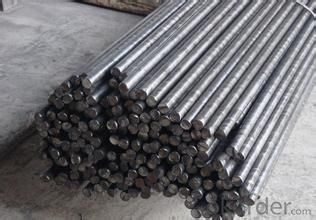
- Q: What are the different alloying elements used in steel round bars?
- There are several alloying elements that can be used in the production of steel round bars. These elements are added to enhance the properties of the steel and improve its strength, durability, and other specific characteristics. Some of the commonly used alloying elements in steel round bars include: 1. Carbon: Carbon is the primary alloying element in steel and helps to increase its hardness and strength. The carbon content in steel round bars usually ranges from 0.2% to 2.1%. 2. Chromium: Chromium is added to steel to improve its resistance to corrosion and oxidation. It also enhances the steel's hardness, strength, and wear resistance. Stainless steel round bars often contain chromium as a major alloying element. 3. Nickel: Nickel is commonly used in stainless steel round bars to improve their corrosion resistance and enhance their mechanical properties. It also increases the toughness and strength of the steel. 4. Manganese: Manganese is added to steel to improve its hardenability, strength, and wear resistance. It also contributes to the steel's ability to withstand impact and shock loading. 5. Molybdenum: Molybdenum is often used in steel round bars to enhance their strength, toughness, and resistance to corrosion. It also improves the steel's high-temperature strength and creep resistance. 6. Vanadium: Vanadium is added to steel to improve its strength, toughness, and wear resistance. It also helps in refining the steel's grain structure, which enhances its mechanical properties. 7. Tungsten: Tungsten is used in steel round bars to increase their hardness, strength, and resistance to wear and corrosion. It also improves the steel's high-temperature strength and toughness. 8. Silicon: Silicon is added to steel to improve its strength, hardness, and resistance to oxidation. It also helps in deoxidizing the steel during the manufacturing process. 9. Copper: Copper is sometimes used as an alloying element in steel to improve its corrosion resistance, thermal conductivity, and electrical conductivity. These are just some of the alloying elements that can be used in steel round bars. The specific combination and proportion of these elements depend on the desired properties of the steel and the intended application of the round bars.
- Q: Are steel round bars suitable for high-stress applications?
- Yes, steel round bars are suitable for high-stress applications. Steel round bars possess high tensile strength, durability, and resistance to deformation, making them ideal for withstanding heavy loads and intense pressure in various industries such as construction, manufacturing, and engineering. The robust nature of steel round bars ensures their suitability for high-stress applications.
- Q: Can steel round bars be used for drive shaft applications?
- Yes, steel round bars can be used for drive shaft applications. Drive shafts are responsible for transmitting torque and rotational motion from the engine to the wheels or other components in various mechanical systems such as automobiles, industrial machinery, and even boats. Steel round bars possess excellent mechanical properties, including high strength, durability, and toughness, which are crucial for withstanding the stresses and loads imposed during operation. They also exhibit good fatigue resistance, allowing them to endure repeated loading cycles without failure. Furthermore, steel round bars can be accurately machined to meet the required dimensions and tolerances for drive shaft applications. They can be heat-treated to enhance their strength and hardness or surface treated to improve corrosion resistance if necessary. Overall, steel round bars are a popular choice for drive shaft applications due to their combination of strength, durability, and machinability, making them well-suited for transmitting power efficiently and reliably in various mechanical systems.
- Q: What are the different types of steel round bar surface defects?
- There are several different types of surface defects that can occur on steel round bars. Some of the most common defects include: 1. Scale: This is a thin layer of oxide that forms on the surface of the steel during the manufacturing process. It appears as a rough, flaky or scaly texture and can be easily removed by pickling or abrasive cleaning. 2. Pitting: Pitting is a localized corrosion that appears as small, shallow holes or depressions on the surface of the steel. It is typically caused by exposure to corrosive substances or environments and can weaken the material if left untreated. 3. Surface cracks: These are small, visible cracks that appear on the surface of the steel round bar. They can be caused by various factors such as improper cooling during the manufacturing process, excessive stress, or improper handling. Surface cracks can reduce the structural integrity of the steel and should be carefully inspected and repaired if necessary. 4. Decarburization: This defect occurs when the surface layer of the steel loses its carbon content, leading to reduced hardness and strength. Decarburization is often caused by high temperatures during heat treatment or improper cooling methods. It can be detected through visual inspection or by conducting hardness tests. 5. Lamination: Lamination defects occur when there are layers or flakes within the steel round bar. These layers can cause weakness in the material and compromise its structural integrity. Lamination defects are typically caused by improper rolling or excessive impurities in the steel. 6. Inclusions: Inclusions are foreign materials or impurities that are trapped within the steel during the manufacturing process. They can appear as dark spots, streaks, or irregular shapes on the surface of the round bar. Inclusions can reduce the strength and ductility of the steel and can be caused by factors such as improper raw material quality or inadequate refining processes. It is important to note that surface defects in steel round bars can vary in severity and impact on the material's performance. Regular inspection and quality control measures are essential to identify and rectify any surface defects to ensure the integrity and reliability of the steel round bar.
- Q: Are steel round bars prone to fatigue failure?
- Yes, steel round bars are prone to fatigue failure. Fatigue failure is the result of repeated cyclic loading or stress on a material, causing it to weaken and eventually fail, even when the applied stress is below its ultimate strength. Steel round bars, like any other structural material, are susceptible to fatigue failure due to their inherent characteristics. Fatigue failure in steel round bars can occur due to various factors, including improper design, inadequate material selection, manufacturing defects, or excessive cyclic loading. Factors such as surface defects, notches, stress concentrations, and corrosive environments can further accelerate the fatigue process. To mitigate the risk of fatigue failure, engineers and designers employ various strategies such as implementing appropriate design practices, selecting high-quality materials, conducting thorough inspections, applying stress-relieving treatments, and considering the impact of cyclic loading during the structural design phase. It is important to note that while steel round bars are prone to fatigue failure, the actual susceptibility depends on numerous factors, including the specific steel grade, loading conditions, environmental factors, and overall structural design. Therefore, it is crucial to carefully assess these factors and employ appropriate mitigation measures to ensure the safe and reliable performance of steel round bars in various applications.
- Q: The problem of dowel bars on concrete pavements?
- The dowel bar is arranged according to the transverse contraction joint and expansion joint set, meaning that a transverse contraction joint and expansion joint place dowels, are not plate must be set. In general, each 200m set a expansion joint, or other road intersection, and bridge connecting point must be set up.
- Q: How do steel round bars compare to copper round bars?
- Different applications call for distinct properties in steel and copper round bars. To begin with, steel round bars are known for their remarkable strength and durability. This versatile material can withstand high levels of stress, making it perfect for structural and industrial uses. With its high tensile strength, steel can resist pulling forces without breaking. Construction projects, automotive components, and machinery manufacturing frequently rely on steel round bars. On the other hand, copper round bars possess unique characteristics that set them apart from steel. Copper is an exceptional conductor of heat and electricity, making it indispensable in electrical wiring and plumbing systems. Its high resistance to corrosion makes copper pipes widely used in plumbing applications. Additionally, copper's antimicrobial properties make it a preferred material for medical equipment and food processing industries. When it comes to cost, steel round bars tend to be more affordable than copper round bars. Steel is abundantly available and has lower production costs compared to copper. This cost advantage makes steel a popular choice for budget-conscious applications. In terms of appearance, steel round bars have a sleek, metallic finish, while copper round bars exhibit a distinct reddish-brown appearance. This visual distinction often influences the selection of materials in architectural and decorative applications. In summary, steel round bars and copper round bars possess different properties that suit them for specific purposes. Steel offers exceptional strength and durability, making it suitable for structural and industrial applications. Copper, on the other hand, is valued for its conductivity, corrosion resistance, and antimicrobial properties, making it ideal for electrical, plumbing, and medical applications. The choice between steel and copper depends on the specific requirements of the project and the desired properties of the material.
- Q: Are steel round bars suitable for high-temperature applications?
- Yes, steel round bars are suitable for high-temperature applications. Steel is known for its excellent strength and heat resistance, making it a reliable choice for various industries that require materials capable of withstanding elevated temperatures. Steel round bars can maintain their structural integrity and mechanical properties even under extreme heat conditions, making them a popular choice for applications such as furnace components, heat exchangers, and high-temperature machinery.
- Q: What is the maximum molybdenum content allowed for steel round bars?
- The allowed molybdenum content in steel round bars varies based on the grade and specific steel requirements. Generally, standard carbon and alloy steels have a maximum molybdenum content of around 0.25-0.30%. However, high-performance steels like tool steels or stainless steels can have a higher maximum molybdenum content, ranging from 1-10%, depending on the grade and application. To determine the precise maximum molybdenum content allowed for a specific steel round bar, it is essential to refer to industry standards, specifications, or material data sheets.
- Q: Can steel round bars be used in the construction of bridges?
- Absolutely, steel round bars are indeed suitable for the construction of bridges. Their exceptional strength, durability, and versatility make them a common choice in bridge construction. They possess remarkable load-bearing capabilities and can endure substantial weights, making them ideal for utilization in bridge beams, columns, and other structural components. Furthermore, steel round bars can be effortlessly welded, bent, and shaped into diverse forms and sizes, allowing for tailor-made designs and streamlined construction procedures. By employing steel round bars, the bridge guarantees both its structural soundness and long-lasting nature, which explains their widespread preference in bridge construction around the globe.
Send your message to us
Common Steel Round Bar SS400 Product with high quality
- Loading Port:
- Tianjin
- Payment Terms:
- TT or LC
- Min Order Qty:
- 25 m.t.
- Supply Capability:
- 7000 m.t./month
OKorder Service Pledge
OKorder Financial Service
Similar products
Hot products
Hot Searches
Related keywords
